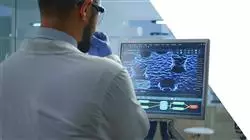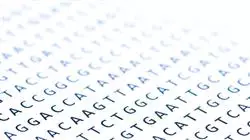University certificate
The world's largest faculty of medicine”
Introduction to the Program
With TECH Global University, you will get up to date on advances in Bioinformatics and Big Data applied to Medicine"

In recent years, the development of bioinformatics has made it possible to achieve great scientific advances in various sectors such as agriculture, food and medicine. It is in this field where the incorporation of new techniques and computer processing have allowed the collection of a large amount of biological data, working with them and even creating a 3D model of the viral protein of the COVID-19 spike. All this not only leads to a better understanding of viral processes, but also to obtaining vaccines or specific drugs in less time.
Likewise, given the speed of mutation and transmission of diseases, the massive collection and analysis of clinical data will lead to more effective action, from prevention to cure. A reality of great interest for medical professionals who want to keep abreast of developments in this field. For this reason, TECH has created this program in Bioinformatics and Big Data in Medicine, developed by a team of professionals with extensive experience in this field.
A 100% online program, where the specialist will be able to delve dynamically into future trends in Bioinformatics computing, analysis techniques used in biomedical datasets or the different tools used from engineering in bioprocesses. All this, through a content with a theoretical-practical approach, complemented with multimedia teaching resources of excellent quality.
In addition, thanks to the Relearning method, the graduate will be able to progressively advance through the syllabus and reduce the long hours of study with the reiteration of key concepts during the course of this program.
In this way, this educational institution offers the specialist the most relevant and current information on Bioinformatics and Big Data in Medicine through a flexible program, which can be accessed whenever and wherever they want. All you need is an electronic device (computer, tablet or cell phone) with an Internet connection to access, at any time, the syllabus hosted in the Virtual Campus. An ideal option for those who seek to balance the most demanding responsibilities with a quality university program.
With this program, you will learn about the use of Machine Learning algorithms in public health and the existing problems with data privacy"
This Postgraduate diploma in Bioinformatics and Big Data in Medicine contains the most complete and up-to-date scientific program on the market. Its most notable features are:
- This Postgraduate Diploma in Bioinformatics and Big Data in Medicine contains the most complete and up-to-date scientific program on the market. Its most notable features are:
- The development of practical cases presented by experts in bioinformatics and databases
- The graphic, schematic, and practical contents with which they are created, provide practical information on the disciplines that are essential for professional practice
- Practical exercises where self-assessment can be used to improve learning
- Its special emphasis on innovative methodologies
- Theoretical lessons, questions to the expert, debate forums on controversial topics, and individual reflection assignments
- Content that is accessible from any fixed or portable device with an Internet connection
The Relearning system, used by TECH Global University, will help you to reduce the long hours of study and to easily learn key concepts"
The program’s teaching staff includes professionals from the sector who contribute their work experience to this educational program, as well as renowned specialists from leading societies and prestigious universities.
The multimedia content, developed with the latest educational technology, will provide the professional with situated and contextual learning, i.e., a simulated environment that will provide immersive education programmed to learn in real situations.
This program is designed around Problem-Based Learning, whereby the professional must try to solve the different professional practice situations that arise during the course. For this purpose, the student will be assisted by an innovative interactive video system created by renowned and experienced experts.
This Postgraduate diploma provides you with the most relevant biomedical, DNA and protein databases in the field of medical research.

This program provides you with the most relevant biomedical, DNA and protein databases in the field of medical research.
Why study at TECH?
TECH is the world’s largest online university. With an impressive catalog of more than 14,000 university programs available in 11 languages, it is positioned as a leader in employability, with a 99% job placement rate. In addition, it relies on an enormous faculty of more than 6,000 professors of the highest international renown.

Study at the world's largest online university and guarantee your professional success. The future starts at TECH”
The world’s best online university according to FORBES
The prestigious Forbes magazine, specialized in business and finance, has highlighted TECH as “the world's best online university” This is what they have recently stated in an article in their digital edition in which they echo the success story of this institution, “thanks to the academic offer it provides, the selection of its teaching staff, and an innovative learning method aimed at educating the professionals of the future”
A revolutionary study method, a cutting-edge faculty and a practical focus: the key to TECH's success.
The most complete study plans on the university scene
TECH offers the most complete study plans on the university scene, with syllabuses that cover fundamental concepts and, at the same time, the main scientific advances in their specific scientific areas. In addition, these programs are continuously being updated to guarantee students the academic vanguard and the most in-demand professional skills. In this way, the university's qualifications provide its graduates with a significant advantage to propel their careers to success.
TECH offers the most comprehensive and intensive study plans on the current university scene.
A world-class teaching staff
TECH's teaching staff is made up of more than 6,000 professors with the highest international recognition. Professors, researchers and top executives of multinational companies, including Isaiah Covington, performance coach of the Boston Celtics; Magda Romanska, principal investigator at Harvard MetaLAB; Ignacio Wistumba, chairman of the department of translational molecular pathology at MD Anderson Cancer Center; and D.W. Pine, creative director of TIME magazine, among others.
Internationally renowned experts, specialized in different branches of Health, Technology, Communication and Business, form part of the TECH faculty.
A unique learning method
TECH is the first university to use Relearning in all its programs. It is the best online learning methodology, accredited with international teaching quality certifications, provided by prestigious educational agencies. In addition, this disruptive educational model is complemented with the “Case Method”, thereby setting up a unique online teaching strategy. Innovative teaching resources are also implemented, including detailed videos, infographics and interactive summaries.
TECH combines Relearning and the Case Method in all its university programs to guarantee excellent theoretical and practical learning, studying whenever and wherever you want.
The world's largest online university
TECH is the world’s largest online university. We are the largest educational institution, with the best and widest online educational catalog, one hundred percent online and covering the vast majority of areas of knowledge. We offer a large selection of our own degrees and accredited online undergraduate and postgraduate degrees. In total, more than 14,000 university degrees, in eleven different languages, make us the largest educational largest in the world.
TECH has the world's most extensive catalog of academic and official programs, available in more than 11 languages.
Google Premier Partner
The American technology giant has awarded TECH the Google Google Premier Partner badge. This award, which is only available to 3% of the world's companies, highlights the efficient, flexible and tailored experience that this university provides to students. The recognition as a Google Premier Partner not only accredits the maximum rigor, performance and investment in TECH's digital infrastructures, but also places this university as one of the world's leading technology companies.
Google has positioned TECH in the top 3% of the world's most important technology companies by awarding it its Google Premier Partner badge.
The official online university of the NBA
TECH is the official online university of the NBA. Thanks to our agreement with the biggest league in basketball, we offer our students exclusive university programs, as well as a wide variety of educational resources focused on the business of the league and other areas of the sports industry. Each program is made up of a uniquely designed syllabus and features exceptional guest hosts: professionals with a distinguished sports background who will offer their expertise on the most relevant topics.
TECH has been selected by the NBA, the world's top basketball league, as its official online university.
The top-rated university by its students
Students have positioned TECH as the world's top-rated university on the main review websites, with a highest rating of 4.9 out of 5, obtained from more than 1,000 reviews. These results consolidate TECH as the benchmark university institution at an international level, reflecting the excellence and positive impact of its educational model.” reflecting the excellence and positive impact of its educational model.”
TECH is the world’s top-rated university by its students.
Leaders in employability
TECH has managed to become the leading university in employability. 99% of its students obtain jobs in the academic field they have studied, within one year of completing any of the university's programs. A similar number achieve immediate career enhancement. All this thanks to a study methodology that bases its effectiveness on the acquisition of practical skills, which are absolutely necessary for professional development.
99% of TECH graduates find a job within a year of completing their studies.
Bioinformatics and Big Data in Medicine
Big data in medicine is an emerging tool that uses data storage, processing and analysis technologies to improve clinical care and medical research. In medical practice, big data enables the collection and analysis of large amounts of information to identify patterns of health and disease, and to improve the quality of healthcare.
One of the biggest challenges is ensuring data privacy and security. It also requires personnel trained in data analysis, and the greater the volume of data, the greater the complexity in handling it....
Applications of big data in medicine
Identifying patterns and trends: Collecting and analyzing large amounts of data can help in identifying patterns and trends in health and disease, which in turn can help in disease prevention or treatment. Early diagnosis: Analysis of large amounts of data can help in early identification of diseases and with that, achieve early intervention and delay the negative effects of diseases. Personalization of treatments: Collecting data on individual patients can help in the personalization of specific treatments, which in turn can improve efficacy and reduce side effects. Medical research: Big data can help identify and evaluate new treatments and therapies through data analysis and outcome comparison.
This specialized program is designed for professionals or students in the medical field. Enroll right now and start your specialization and delve into Big data in medicine is an increasingly important tool for healthcare and medical research, as it enables the collection and analysis of large amounts of data to identify patterns and trends in health and disease, improve the quality of clinical care, and develop new therapies and treatments.







